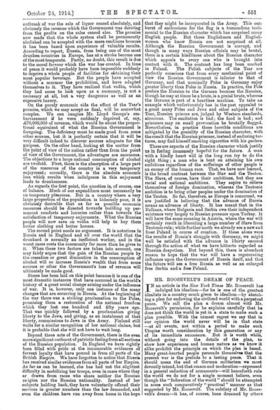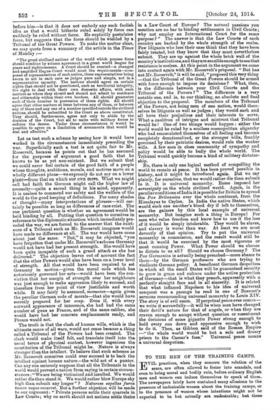MR. ROOSEVELT'S DREAM OF PEACE.
IN an article in the New York Times Mr. Roosevelt has indulged his idealism—for he is one of the greatest idealists in a country much given to idealism—by sketch- ing a plan for endowing the civilized world with a perpetual peace. We call the plan a dream almost with Mr. Roosevelt's permission, for be explains carefully that he does not think the world is yet in a state to make such a plan possible. With the utmost regret we say that in our opinion the world never will be in that state —at all events, not within a period to make such Utopias worth consideration by this generation or any of its immediate successors. But it is worth while, without going into the details of the plan, to show how experience and human nature as we know it alike prohibit the principle on which the plan is based. Many great-hearted people persuade themselves that the present war is the prelude to a lasting peace. That it should mean the end of German militarism we most devoutly intend, but that reason and moderation—expressed in a general reduction of armaments—will henceforth rule the world we do not for a single moment believe, even though the " federation of the world " should be attempted in some such comparatively " practical" manner as that suggested by Mr. Roosevelt. The subtlety of Mr. Roose- velt's dream—it has, of course, been dreamed by others before him—is that it does not embody any such foolish idea as that a world hitherto ruled solely by force can suddenly be ruled without force. He explicitly postulates force, but suggests that the force should be wielded by a Tribunal of the Great Powers. To make the matter clear, we may quote from a summary of the article in the Times of Monday :— " The great civilized nations of the world which possess force should combine by solemn agreement in a great world league for peace and righteousness. A Court should be created—a changed and amplified Hague Court would meet the requireinents—com- posed of representatives of each nation, these representatives being sworn to act in each case as judges pure and simple, not in a representative capacity. The nations should agree on certain rights that should not be questioned, such as tenitorial integrity, the right to deal with their own domestic affairs, with such matters as whom they should and should not admit to residence and citizenship within their own borders. All should guarantee each of their number in possession of these rights. All should
agree that other matters at issue between any of them, or between any of them and any one of a number specified outside the civilized nations, should be submitted to the Court as above constituted.
They should, furthermore, agree not only to abide by the decision of the Court, but all to unite with military forces to
enforce the decree. Under these circumstances it would be possible to agree on a limitation of armaments that would be real and effective."
Let us test such a scheme by seeing how it would have worked in the circumstances immediately preceding the war. Superficially such a test is not quite fair to Mr. Roosevelt, because he points out that ho has assumed for the purposes of argument a good faith that he knows to be as yet non-existent. But we submit that we could never feel certain of the good faith of a people whose thoughts, ambitions, morals, and motives move on a wholly different plane—we expressly do not say on a lower plane—from that on which our own move. What we might call bad faith the German might call the higher law of necessity—quite a sacred thing in his mind, apparently. It is useless to commend our safety and the welfare of the world to the good keeping of definitions. For many shades of thought—many interpretations of phrases—will cer- tainly be possible so long as differences of race exist. The one pertinent question is whether an agreement would be held binding by all. Putting that question to ourselves in reference to the diplomatic situation which immediately pre- ceded the war, we are forced to the answer that the exist- ence of a Tribunal such as Mr. Roosevelt imagines would have made no difference at all. The war would have come about just the same. "But," it may be objected, "you have forgotten that under Mr. Roosevelt's scheme Germany would not have had her present strength. She would have teen quite incapable of such a grand attack as she has delivered." The objection leaves out of account the fact that the other Powers would also have been on a lower level of strength. All that would have been required to set Germany in motion—given the moral code which has notoriously governed her acts—would have been the con- viction that her margin of strength over her neighbours was just enough to make aggression likely to succeed, and therefore from her point of view justifiable and worth while. It may fairly be assumed, moreover—again given the peculiar German code of morals—that she would have secretly prepared for her coup. Even if, with every outward appearance of innocence, she had had the same number of guns as France, and of the same calibre, she would have had her concrete emplacements ready, and France would not.
The truth is that the clash of human wills, which is the ultimate cause of all wars, would not cease because a thing called a Tribunal of the Powers had been created. The clash would make itself felt, and translate itself into the usual terms of physical contest, however ingenious the constitution of the Tribunal might be. 'Nature is always stronger than the intellect. To believe that such schemes as Mr. Roosevelt conceives could ever succeed is to back the intellect against human nature—the wild act of a punter. Can any one seriously suppose that all the Tribunals in the world would prevent a nation from saying in certain circum- stances : "We are being victimized and insulted. We would rather die than stand it. We would rather blow Europe sky high than submit any longer" ? Naturam expellas furca Lumen usque recurret. But a further objection will be made to our argument : " Private persons settle their quarrels in Law Courts; why on earth should not nations settle theirs in a Law Court of Europe ? The natural passions you mention are no bar to binding settlements in Civil Courts ; why not employ an International Court for the same purpose ? " The answer is that the Law Courts of each country are backed by the whole strength of the realm. Few litigants who lose their case think that they have been fairly treated, but they know that they must nevertheless submit. They are up against the whole brick wall of the country's institutions, and theyere sensible enough to see that resistance is useless. At this point in the argument we come into contact again with Mr. Roosevelt's prbposal. " But has not Mr. Roosevelt," it will be said, " proposed this very thing —that the Tribunal of the Great Powers should be armed with force enough to impose its decisions ? What, then, is the difference between your Civil Courts and the Tribunal of the Powers ? " The difference is a very notable one, and is, to our thinking, an absolute and final objection to the proposal. The members of the Tribunal of the Powers, not being men of one nation, would them- selves be litigants as well as judges ; they would each and all have their prejudices and their interests to serve. What a cauldron of intrigue and mistrust that Tribunal would be ! One of two things would happen : either the world would be ruled by a soulless cosmopolitan oligarchy who had emasculated themselves of all feeling and become completely denationalized, or the stronger wills, frankly governed by their patriotic desires, would rule the weaker wills. A few men in close community of sympathy and policy would be able to bully the whole world. The Tribunal would quickly become a kind of military dictator- ship.
No, there is only one logical method of compelling the world to remain at peace. It has been proved possible in history, and it might be introduced again. But wo say plainly, for ourselves, that we would rather die than submit to it. It is universal monarchy. Rome imposed her sovereignty on the whole civilized world. Again, in the peculiar conditions of India it is possible for Britain to spread the Pax Britannica over the whole continent, from the Himalayas to Ceylon. In India the native States, which would suck one another's blood dry if left to themselves, are the gainers by this local example of universal monarchy. But imagine such a thing in Europe ! For men who value freedom and know how to use it the loss of it would be simply intolerable. They would be slaves, and slavery is worse than war. At least we are most devoutly of that opinion. Try to put the universal monarchy in commission, and the result would still be that it would be exercised by the most vigorous or most cunning Power. What Power should we choose to dictate to us all ? Should we choose Germany ? The Pax Germanica is actually being preached—more shame to them—by the German professors who are trying to vindicate German policy. A beneficent German despotism in which all the small States will be guaranteed security to grow in grace and culture under the active protection of Germany—that is what they preach, apparently with a perfectly straight face and in all sincerity. It is related that what inflamed Napoleon to his idea of universal conquest was a passage he read in one of Bossuet's sermons recommending universal monarchy to Louis XIV. The story is of evil omen. If perpetual peace ever comes— we write it sorrowfully—it will be when men have changed their devil's nature for that of angels, or when they are craven enough to accept without question or resentment the decisions of some gigantic Power strong enough to hold every one down and oppressive enough to wish to do it. Then, as Gibbon said of the Roman Empire —" the whole world would be but a safe and dreary prison to the Caesar's foes." Universal peace means a universal despotism.



































 Previous page
Previous page